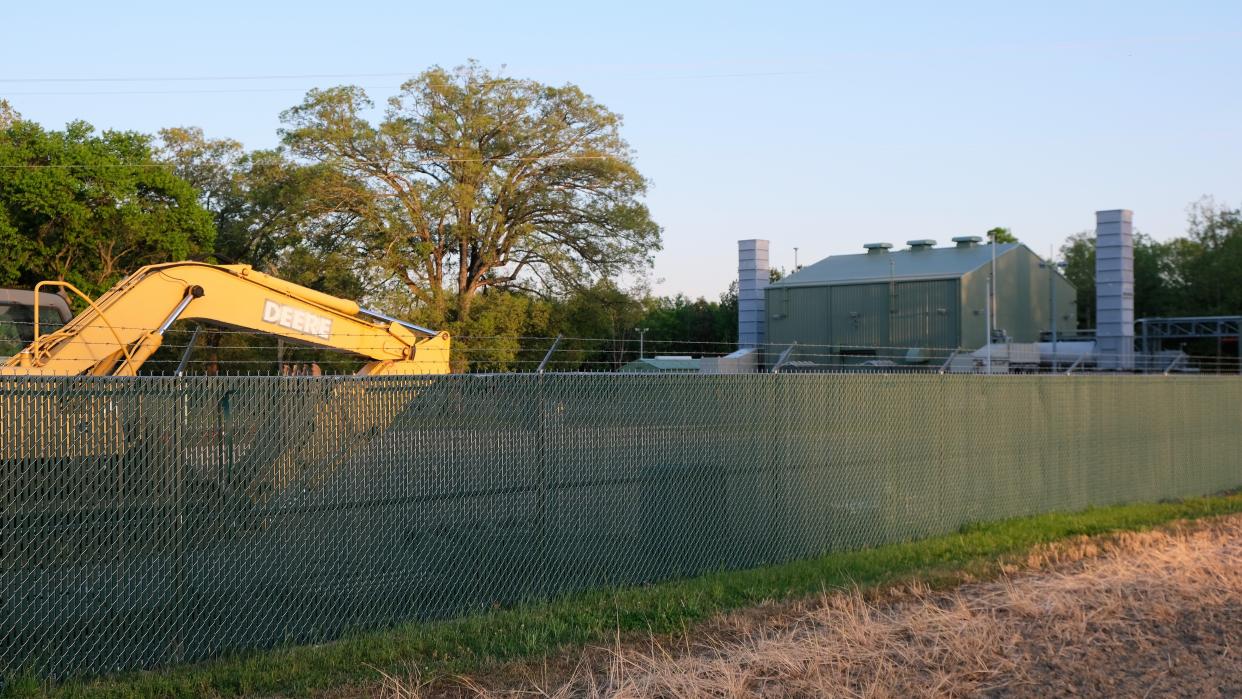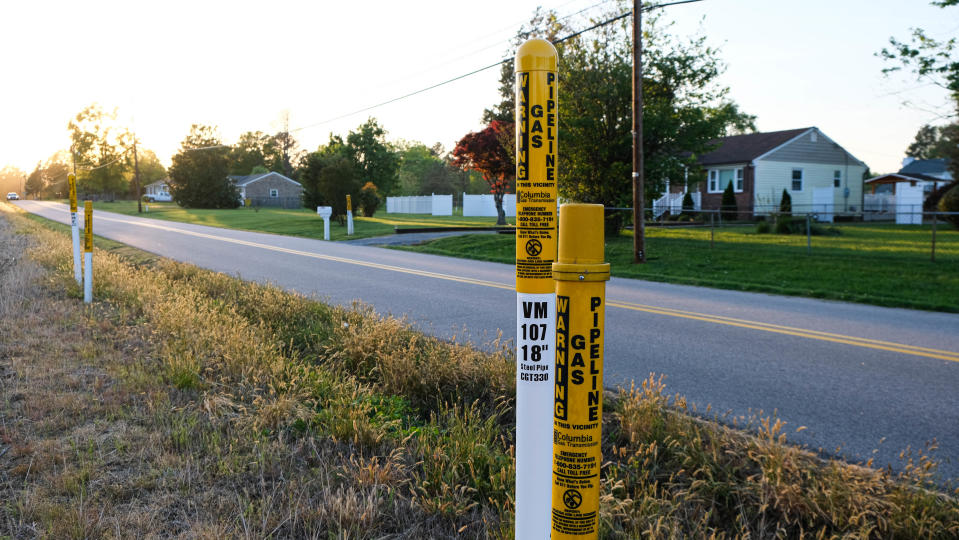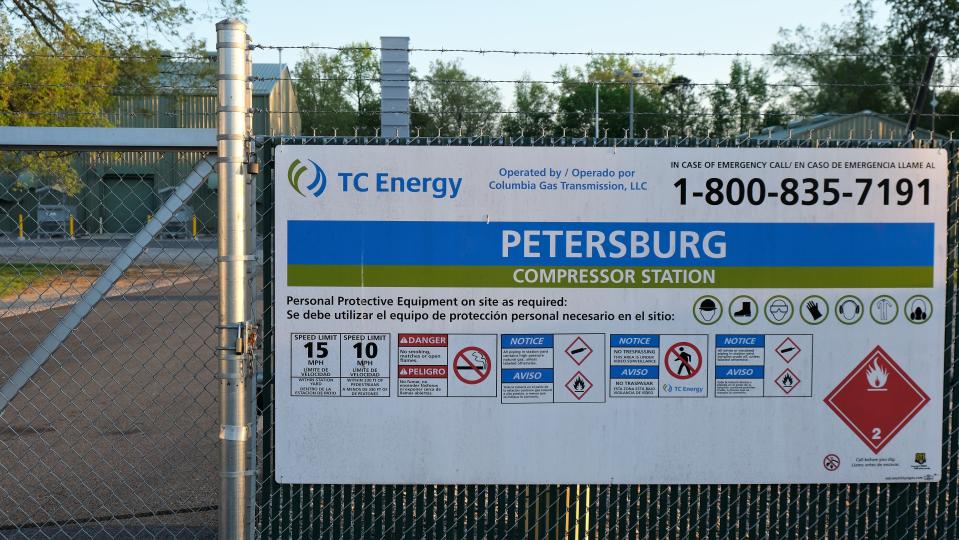Petersburg and Prince George could see more pollutants coming from the natural gas compressor station

NOTE: This story has been updated to include a statement from TC Energy.
Petersburg and Prince George residents could very likely see an increase in toxic pollutants in their area soon, as a natural gas company plans to upgrade its compressor station located in Prince George bordering Petersburg.
What is a compressor station and why is this important?
TC Energy delivers natural gas to the Hampton Roads area by way of underground pipelines that run through Petersburg, Prince George, Surry, South Hampton, and Sussex. This natural gas is used for the Hampton Roads residents and businesses for heating, electricity generation, and to power stoves.
Gas is moved through the pipelines by compressor stations, which pressurizes the gas so that it can travel. Natural gas needs to be pressurized every 40 to 100 miles.
TC Energy’s compressor station is located at 1596 Baxter Road in Prince George—right next to the Petersburg border. This location has gas-fired turbines, responsible for compressing the gas, and the turbines have smoke stacks, or “chimneys” that emit pollutants.
Though the compressor station is technically in Prince George county, TC Energy brands it as the "Petersburg Compressor Station."
Tens of thousands of miles of pipelines, dozens of leaks and spills
TC Energy, formerly known as TransCanada, has nearly 58,000 miles of natural gas pipelines and supplies about one-quarter of natural gas to consumers in North America, according to their website. It also has 3,000 miles of pipeline that transport crude oil.
Perhaps TC Energy’s most infamous pipeline is the Keystone Pipeline. This 2,687-mile pipeline, which pumps crude oil from Canada into refineries across the U.S., has been known for its oil leakages. It's had nearly two dozen spills since it started operating in 2010.
TC Energy’s most recent oil spill and the largest in its history happened this past December, when the Keystone Pipeline leaked about 500,000 gallons into a creek in rural Kansas. It’s also the largest oil spill in the U.S. in the past decade.
The plan to widen the pipeline requires more power to keep the gas moving
TC Energy says they need to bring more gas to the Hampton Roads region to accommodate a greater demand. In order to do so, they will widen the pipeline from a 12-inch diameter to 24 inches. Fifty miles of the pipeline will be replaced, starting from Sussex to Chesapeake.
They have dubbed this project the “Virginia Reliability Project,” and they intend to start construction mid-2024 and finish by the end of 2025.
The compressor station will have to power more gas through the wider pipeline. This in turn will increase the pollutants emitted at the compressor stations. They have two compressor stations in the area--one located in Prince George and the other in Emporia.
How will this affect the immediate surrounding area?
Those living around the compressor station will bear the brunt of the health impacts, says Itai Vardi, a researcher at the Energy and Policy Institute.
Doubling the horsepower of the compressor station in Prince George will see an increase of pollutants in the air. The pollutants emitted by the compressor station include particulate matter, gases and chemicals harmful to human health such as carbon monoxide, nitrogen oxide, and sulfur dioxide. In addition, it emits pollutants harmful to the ozone layer such as carbon dioxide and methane.
The ozone levels for Petersburg are already elevated. “So any additional sources of ozone precursors is not ideal,” said Amy Townsend-Small, an Environmental Science professor at the University of Cincinnati who looked at the city’s ozone levels.
Carbon monoxide levels will be increased to 98.63 tons per year with more horsepower, according to the emissions chart provided to the Federal Emissions Regulatory Commission (FERC) by TC Energy. This measurement is just a smidgen under the Title V threshold of 100 tons per year.
Carbon monoxide is odorless and colorless. Though undetectable to the human senses, low exposures to this poisonous pollutant can cause fatigue, headaches, dizziness, and shortness of breath. Inhaling high levels of CO may cause vomiting, confusion, a loss of coordination and consciousness, and even death.
The levels of nitrogen dioxide and sulfur dioxide will exceed the safety integrity level (SIL) standards for those living within .6 miles of the compressor station, according to the report released by FERC, the government agency tasked with regulating the transmission of natural gas and electricity. These gasses can also affect the lungs.
The fine particulate matter and the formaldehyde emitted at the compressor station “threaten human health at any level of exposure,” said Claire Horan, an associate attorney at the Southern Environmental Law Center. At low levels, breathing in formaldehyde can cause irritation in the eyes and throat. Higher levels of exposure can cause wheezing and change the lung function.
“These increases in localized air pollution are of even greater concern because the Petersburg Compressor Station is located in and near to environmental justice communities," said Horan. “Environmental justice communities often disproportionately bear the adverse environmental impacts of gas infrastructure projects and are often particularly vulnerable to the health risks of these pollutants."
Should a region already vulnerable to health risks take on more?

The compressor station is situated in a residential neighborhood. Homes stand nearby along Baxter Rd. and adjacent streets. Less than a mile away sits a high school academic learning center, a nursery, churches, and two apartment complexes: Liberty Pointe and Pinetree Apartments.
Residents of this majority-Black city already suffer many health disparities, and a more powerful compressor will put the residents’ health at a greater risk, says community advocate Lafayette Jefferson.
Petersburg has consistently ranked as the unhealthiest or one of the lowest out of all 133 cities or counties in Virginia each year since the Population Health Institute began compiling data in 2010.
Petersburg’s average life expectancy, at 66.2 years, is over a decade behind the state’s average, at 79 years. And the city already has the highest asthma hospitalization rate in the Central region, according to a 2018 report by the Virginia Department of Health.
“We already have severe disparities and this could cause greater impact, especially in low income and communities of color,” said another community advocate Pat Hines, who is leading the effort to resuscitate the local chapter’s NAACP.
Exposure to these types of pollutants over longer periods of time results in larger impacts, and some age groups including the elderly and children are more vulnerable, says Horan.
The compressor station has been running since the ‘50s, with no end in sight.
More: What makes a city healthy? Study puts Petersburg's 'health' at the bottom of the Va. list.
Why doesn’t TC Energy install an environmentally friendly compressor station in Prince George?
TC Energy will be building a new hybrid compressor run by electricity that would not produce emissions in their other station in Emporia.
So why doesn’t TC Energy also install a hybrid compressor in Prince George?
Vardi thinks it’s because only a few years ago, TC Energy spent millions of dollars to install new gas-fired turbines. TC Energy spent around $45 million on the new turbines, according to a letter the company sent to FERC the regulating body.
“They’re not going to change that, not for the health of the people around the station,” said Vardi. “So at the end of the day, this boils down to money and whose health is being valued.”
Living in the 'sacrifice zone'

TC Energy is planning to ship all the increased gas capacity down to the Hampton Roads area and sell it to the gas utility in that region.
“In that sense, Petersburg is not "benefitting" at all from an increase in the gas supply, it's only left with the pollution — which, by definition, is what a 'sacrifice zone' is,” said Vardi.
TC Energy says that this project will bring 26 jobs to the region and a one-time pulse of economic activity to Prince George, including $1.1 million in associated labor income.
There is no major construction needed on the compressor station. TC Energy plans to install two new gas coolers.
“That is minimal work,” said Vardi. “This is certainly not a boom to the local economy or workforce in any way. It's minimal and temporal.”
Public hearing on April 25 will give you 3 minutes to speak your mind
FERC will be holding a public hearing on Tuesday, April 25 from 5-8 p.m. at the Appomattox Event Center located at 9 W. Old Street in Petersburg. Citizens will get three minutes each to present their thoughts.
“My major concern is that I didn’t even know that this was going on,” said Hines, who only found out about TC Energy’s plans a week ago when the company is already far along in its process of getting their plans up and running.
According to Vardi, TC Energy says that it does not need a new air permit for the doubling of the horsepower since it already received one from the Virginia Department of Environmental Quality in March 2020, shortly after it installed two new gas-fired turbines.
At that time, however, TC Energy stated that only one of the turbines will be operational while the other will be turned off and serve as back up. Now, TC Energy is asking FERC to approve the certification of turning on the second turbine without going back to the VDEQ for a new air permit.
“That's problematic since a VDEQ air permit requires a robust public notification and comment process, which has been taken away from the residents of Petersburg," said Vardi.
Update:
TC Energy released the following statement: “The Virginia Reliability Project (VRP) will continue to build on TC Energy's commitment to invest in emissions limiting technology for our assets in Virginia. Upgrading the existing natural gas pipeline will not only create more than 3,500 jobs and generate over $500 million in economic output for Virginia, it will also help protect our environment by replacing a 70-year old pipeline with new technology that reduces emissions and improves safety enhancements. That’s why the VRP has strong bipartisan support from leaders in the region and across the state. We look forward to continuing our robust community outreach program which provides project information and invites dialogue with local residents and businesses that may be impacted by VRP construction, especially those in environmental justice communities. The VRP team has also committed to utilize local small, women, and minority-owned businesses for the project to the greatest extent possible.”
Joyce Chu, an award-winning investigative journalist, is the Social Justice Watchdog Reporter for The Progress Index. Contact her with comments, concerns, or story-tips at Jchu1@gannett.com or on Twitter @joyce_speaks.
This article originally appeared on The Progress-Index: TC Energy to up the horsepower and pollutants of the Petersburg Compressor Station

